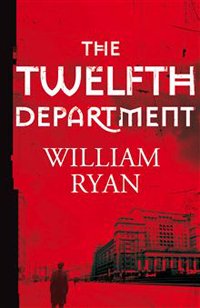
Watching over everyone’s moves and thoughts are the Narodnyy Komissariat Vnutrennikh Del, the dreaded law enforcement agency of The Communist Party. As Korolev is called in to investigate the death of first one, and then a second scientist from a mysterious human behaviour research unit, he comes to the attention of not one NKVD department, but two – including the notorious ‘Twelfth’. There is a bitter rivalry between the two departments, and each is eager to use Korolev and his murder investigation to discredit the other.
Korolev has a young son, Yuri, and an ex-wife called Zhenia. When Yuri goes missing, and when Korolev hears that his Zhenia has fallen foul of the secret police, he comes under almost unbearable pressure. With the help of his assistant Slivka, he discovers that the first scientist to die, Azarov, was responsible for overseeing highly suspect experiments in behaviour modification, carried out on orphans and street children. Did the second scientist, Shtange, threaten to expose the work of the institute? If so, was he killed to shut him up? Korolev realises that he must try to keep both NKVD departments happy, solve the murders, and save his wife and son.
Korolev is a decent, caring and conscientious policeman. He has a backbone of courage, leavened by a very good sense of when bravery can become stupidity – particularly when the various departments of the NKVD are concerned. His desperate love for his son is a warm thread of human normality which runs through the otherwise fairly brutal fabric of the novel. The plotting is careful and plausible, the characters well drawn, and the writing style is confident and unhurried. The Moscow background and historical context seem impeccable; the pall of deceit, mutual suspicion and fear cast over everyday life by The Party is almost tangible. This may seem an odd note of praise, but the author has said a resounding niet to peppering the dialogue with pointless foreign language colloquialisms. I just wish all authors who set stories in non English-speaking countries would follow Ryan’s example.
My only caveat about what would otherwise have been an excellent book, is the lack of tempo. We do seem to have page after page of rather measured and deliberate conversation between the various witnesses, officials and suspects. Clearly, there is a crime to be solved by Korolev, and clues to be picked up by the reader, but at times the story could have done with an increase in pace, and some forward momentum. Much as it must have been nearly impossible for a decent policeman to keep his head above water in the swamp of intrigue and corruption that typified Stalin’s Russia, I did occasionally want to give the good Captain Koralev a poke with the proverbial pointed stick, and tell him to get on with it.
That said, the Twelfth Department will not disappoint fans of the Koralev series, or those who have an interest in a well-researched historical whodunnit with a political twist.
Mantle
Print/Kindle/iBook
£7.25
CFL Rating: 4 Stars